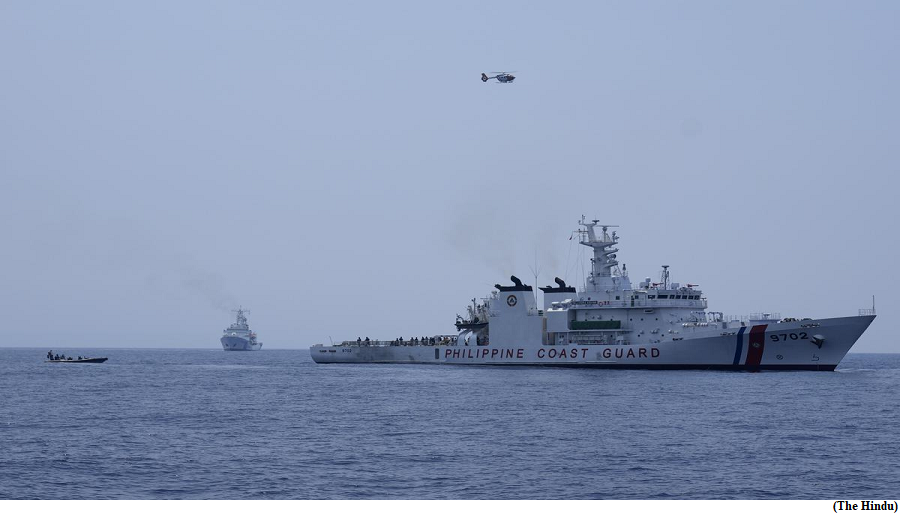Quiet diplomacy could ease South China Sea tensions (GS Paper 2, International Relation)

Context:
- The Foreign Ministers of India and the Philippines met at the fifth meeting of the Philippines-India Joint Commission on Bilateral Cooperation recently.
- Building on the shared interests of the two maritime Asian republics and nearly 75 years of diplomatic history, they outlined the path for a strengthened bilateral partnership between both nations in the 21st century.
Key Highlights of the meet:
- The decision to open the resident defence attaché office in Manila;
- boosting cooperation between the Coast Guards of the two countries;
- acquisition of naval assets by Manila under a concessional line of credit from India;
- expansion of training and joint exercises on maritime security and disaster responses, and
- commencing a maritime dialogue.
The South China Sea issue:
- The most notable development was the agreement on regional and multilateral issues, particularly on maritime highways such as the South China Sea.
- While India reiterated its consistent position on adhering to international law, including the United Nations Convention on the Law of the Sea (UNCLOS), its unambiguous call to respect the 2016 Arbitral Award on the South China Sea is a departure from India’s earlier position. From ‘noted’ to ‘adherence to the 2016 Arbitral Award’ is a candid recognition of its legitimacy.
- The Philippines had submitted a case of arbitration to the Permanent Court of Arbitration (PCA) in order to settle disputes with China. Despite China’s formal withdrawal from the arbitration on February 19, 2013, the proceedings continued as scheduled under UNCLOS guidelines.
Arbitral Award of 2016:
- The UNCLOS’ Annex VII stipulates: “The absence of a party or the failure of a party to present its case shall not be a bar to the proceedings.” The PCA finally released the Award on July 12, 2016.
- The arbitration took into account maritime rights, the status of particular marine features, historical rights, and the legitimacy of particular Chinese actions in the South China Sea, that Manila claimed to be illegal.
- The tribunal’s decision is “final and binding” in accordance with UNCLOS Article 296 and Article 11 of Annex VII.
- The PCA denied China’s assertion that it had historical rights in the South China Sea, and the unanimous decision was unexpectedly in the Philippines’ favour. It further stated that any prior claims to resources situated inside the “nine-dash line” were unfounded.
- The tribunal determined that development and land reclamation had fundamentally changed the reefs in contravention of UNCLOS commitments. China has “inflicted irreparable harm to the maritime environment” in addition to “destroying evidence of the natural condition of features in the SCS (South China Sea)”.
- The Tribunal also found that “China has violated the sovereign rights of the Philippines in its Exclusive Economic Zone (EEZ) by
- interfering with Philippines’ fishing and petroleum exploration,
- constructing artificial islands, and
- failing to stop Chinese fishermen from fishing in the zone”.
- It added that China had reduced the traditional fishing rights of Filipino fishermen and that by physically obstructing Philippine vessels, Beijing had raised the “serious risk of collision” at sea. Finally, it determined that China had no legal basis for asserting historic rights to resources located within the sea areas under the Tribunal’s jurisdiction.
- The Tribunal emphasised that the dispute is driven by their fundamentally different interpretations of separate rights under UNCLOS in the South China Sea.
Need for quiet diplomacy:
- The South China Sea is a crucial maritime gateway and junction for shipping between the Pacific and Indian Oceans. Any confrontation in the South China Sea, one of the world’s most vital oceans in terms of geopolitics, economy, and strategy, will be a danger to regional and global security.
- As free and stable marine commons are crucial to global trade and economy, India and many other nations have an interest in safeguarding the water lanes that pass through the region.
- Despite the fact that the PCA declared its decision, the reality on the ground has not altered, making it practically impossible to carry out the decision.
- By reiterating the need for a peaceful conflict resolution that fully respects legal and diplomatic channels and abides by the ruling, India has sent a strong message that the region wants peace and respect for international law.
Conclusion & Way Forward:
- There is a realisation that the South China Sea problem requires a political framework, which can only be created through dialogue.
- Leaders of the Association of Southeast Asian Nations (ASEAN) should try to find a political solution through “quiet diplomacy”, as the potential for resolving this issue through legal methods is very low.
- The creation of a “political framework” and progress towards a legally binding “code of conduct” falls more on the shoulders of ASEAN’s leaders. If the ASEAN nations want to convey a crucial political message to China, greater understanding is needed among themselves.


